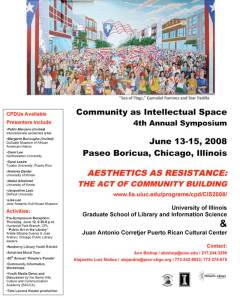 The 4th Annual Community as Intellectual Space symposium is being held this week at Paseo Boricua in Chicago, June 13-15. Events will start at the Puerto Rican Cultural Center (PRCC), 2739/41 W. Division (near corner of Division and California).
The 4th Annual Community as Intellectual Space symposium is being held this week at Paseo Boricua in Chicago, June 13-15. Events will start at the Puerto Rican Cultural Center (PRCC), 2739/41 W. Division (near corner of Division and California).This year, the focus is on Aesthetics as Resistance: The Act of Community Building. There will be artist-led tours of the beautiful murals found throughout the neighborhood, the annual People's Parade, a delicious Puerto Rican dinner, workshops on community-education activities as diverse as urban agriculture and computer programming for children using Squeak, meetings with local Humboldt Park/Paseo Boricua community and government leaders, including Rep. Luis Gutierrez and Rep. Cynthia Soto, and panels on liberatory education. [Click to enlarge the poster or follow the link above for more details.]
Aesthetics as Resistance promises an active dialogue on art, identity, and cross-cultural community building with community leaders, artists, educators, librarians, activists, students, and residents. It expresses the PRCC's vision to build community grounded in cultural practice, including murals, poetry, music, and the People’s Parade. These practices are both creative and political acts to develop community out of local funds of knowledge.
Paseo Boricua has a motto: 'Live and help others to live.' It is known for its multigenerational and holistic community activism around human rights and social change. Education is structured around the belief that ‘the community is the curriculum,’ reflecting the ideas of Paulo Freire and providing a contemporary version of Hull House.
With its many academic partnerships, Paseo Boricua also provides an outstanding example of university-community collaboration in research, teaching and public engagement. For example, last year the community hosted a tour and visit for the John Dewey Society. This furthered dialogue around how the community answers Dewey's call for critical, socially-engaged citizens, for an active public, and for education as lived experience.
[Note: I also posted this on my own blog.]
No comments:
Post a Comment